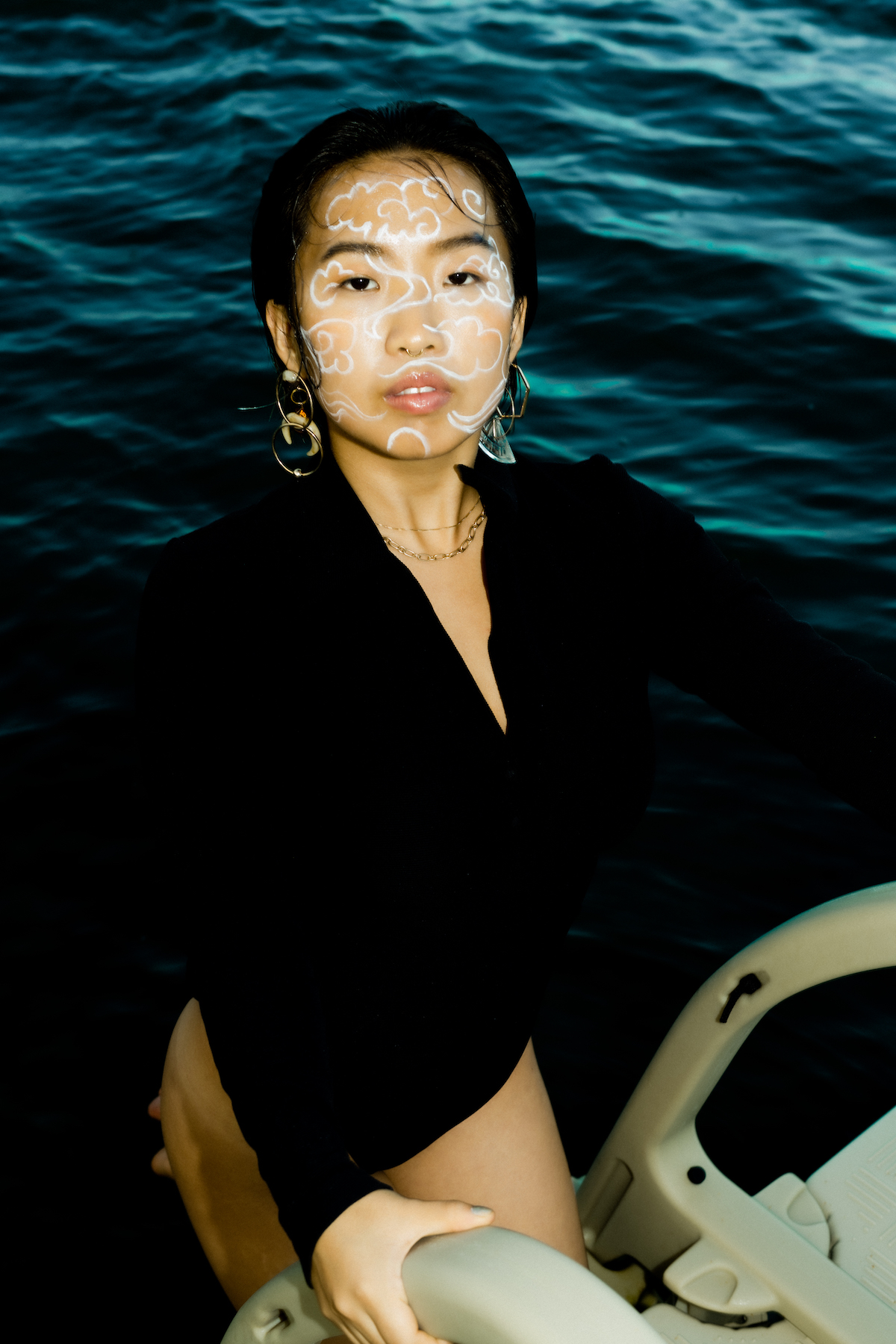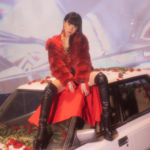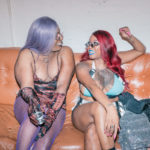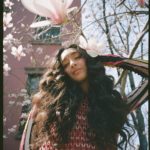"It was actually a family situation," she recalls. "I remember leaving my dog back home…
Hunjiya
An interview with the independent Korean-American music artist13 October 2020
Independent Korean-American artist Hunjiya has just come out with a new project indigoworld, a duo with producer Justin Trout, which mixes Hunjiya’s delicate vocals with indie electro pop sounds. We sat down to chat with the artist about this new project, as well as her previous work, and exploring what it means to be an Asian American.
Your debut album Lineage, which was released in 2017, focused on unpacking your Korean identity. You then followed this up with Look After August (2019), where you explored new themes, still centering around your personal development, but this time focusing on a past relationship and learning to be okay with being alone. In your interview with Vogue UK, you explained that with Look After August, you wanted it to feel like it was coming back full circle from Lineage. “After I reconnected and explored who I was in terms of heritage, I wanted to explore other sides of me. So, this is a self-discovery album.” You are currently working on a new musical project, indigoworld, alongside producer Justin Trout. Is indigoworld a chance for you to explore new themes lyrically and musically?
Hunjiya: I believe it can be interpreted that way! Actually, I had the indigoworld songs written and recorded before Look After August came out. We just took a while to finalise everything for the releases. I feel like indigoworld was a chance for me to explore writing a song while collaborating on production, as I usually produce my own works… It definitely changed the way I write lyrics. I listen to a broad range of music so whatever I’m liking at the time always affects what I end up creating.
The sounds audiences were presented with on Lineage, especially on the track “Kim”, had strong stripped-back and emotional indie-folk singer-songwriter vibes and brought to mind other artists like Daughter and Puzzle Muteson. While “28B (The Window Seat)” and “After August” still lived within these sounds, the majority of Look After August had a larger, more produced sound with poppy alt R&B and neo-soul elements which would be right at home on a playlist alongside Novaa, Sinead Harnett, Kali Uchis, and ZOLA. Audiences have already gotten a taste of indigoworld via your debut singles “hourglass” and “deadinthewater” which are driven by synths and other classic sounds from the electronic music genre. How would you personally describe indigoworld’s sounds and influences and it’s departure from your albums under Hunjiya?
Hunjiya: Funny you mention ZOLA because she’s a friend of mine. I collaborated with my friend Justin Trout on this project so I feel like our different styles meshed together to create something out of the ordinary for both of us. If I were to describe it, I guess it’s more electronic based with more percussive elements. I still think it’s within my style, but just a different approach and written during a different time in my life.
Hunjiya: I tend to write based on my experiences so I feel the two projects differ in how I’m feeling at the time. My new project was actually written a long time before Look After August. Funny enough, most of the songs I wrote for indigoworld kind of came from subconscious thought and didn’t have anything directly to do within my own personal life. It wasn’t until after the relationship I was in at the time ended, that I realised I was writing how I was truly feeling.
Indigoworld’s debut EP Fold just dropped. What kind of themes can audiences expect? Will there be a departure from the previous singles, or follow along the same trajectory? Hunjiya: Vulnerability. But I believe these themes and expectations can only be known once the audience listens to it.
Trout and you have been working together for two years via online collaboration. Does that mean the work you have both done together only takes place digitally? What has this process been like, and if you both collaborate in the digital world, has the pandemic still affected this process?
Hunjiya: We met in university after a friend of mine showed me a demo he posted on Soundcloud, and I was in awe with his production and wanted to collaborate. After meeting, we enrolled in this ensemble group where you form a group and showcase the work you make. Justin would send me a bunch of demos over Wetransfer and it ended up being easier for us to work in our own respective places and then meeting once every few weeks to discuss what we wanted to change, what we liked, and just listen to new music.
Our creative processes always happened separately, but sometimes we mixed the project together in person. After COVID hit, it wasn’t too different to be honest, but it was a bit tricky figuring out what we wanted to do with the visuals. We originally intended to have a music video for each song, but with COVID we had to get creative.
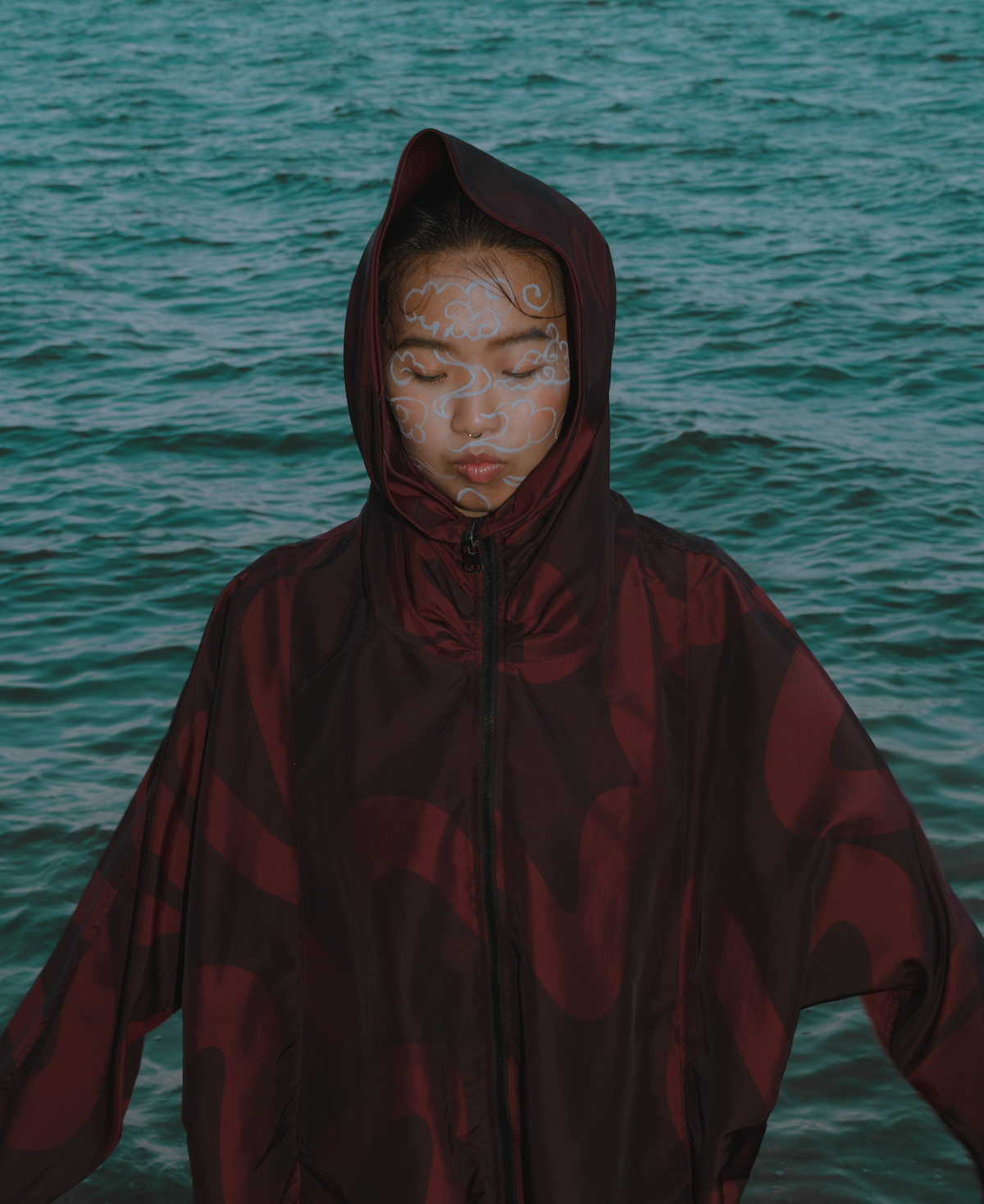
Returning to your first album, we wanted to chat with you about your experience as an Asian-American and your feelings on the Asian diaspora as a “zero generation” American. Can you elaborate on these themes?
Hunjiya: I grew up in a small town with the population being 95% white, but the majority of my friends I’ve had since kindergarten were also BIPOC immigrants/zero-gen/first-gen. Even so, I had the common experiences with bringing my mom’s Korean lunches to school and being made fun of, avoiding learning my native tongue because I thought I would never use it, and all of the “Asian-American girl growing up in a white town” stories we’ve heard before.
In college, I was in a program where the majority was white so there were some moments where I felt distant from my peers. Then whenever I would visit Korea, I would feel so culturally different and confused because there were people who looked like me, but I felt a disconnect from them and even my family especially because I couldn’t properly communicate in Korean.
It took me a really long time to come to terms with my identity and understand that a lot of the time, I kept associating my identity with my white friends when talking about my “American culture” side. However, I’ve grown to realise that as a zero-gen, being “American” doesn’t equal being “white,” and it can mean whatever experience/cultural upbringing you grew up in. I think that’s the beauty in the immigrant/zero-gen/first-gen experience. We’re not either or, we’re an ever-growing mix of experiences.
What was your time and experience re-finding your roots in Korea like? Were there certain aspects that made you feel more “at home” in South Korea than in the US and vice versa?
Hunjiya: I’ve visited Korea a few times before my trip in 2017, but because I was so young, I saw it more as a vacation where my parents were taking me from place to place. In 2017, I was 19 and roaming around by myself for 3 months so I was forced into situations where I had to speak only Korean. Before the trip, I tried teaching myself Korean so I wouldn’t butcher it completely when I got there. During that trip, I felt the most connected to my culture because it was the first time where I was able to have long conversations with my grandparents and relatives. Getting to know my family’s history and the cultural differences helped me understand my parents better and the difficulties they must’ve had coming to America.
Both Korea and the US now feel like home to me in their own refreshing ways because there are parts of my identity that relate more to each place.
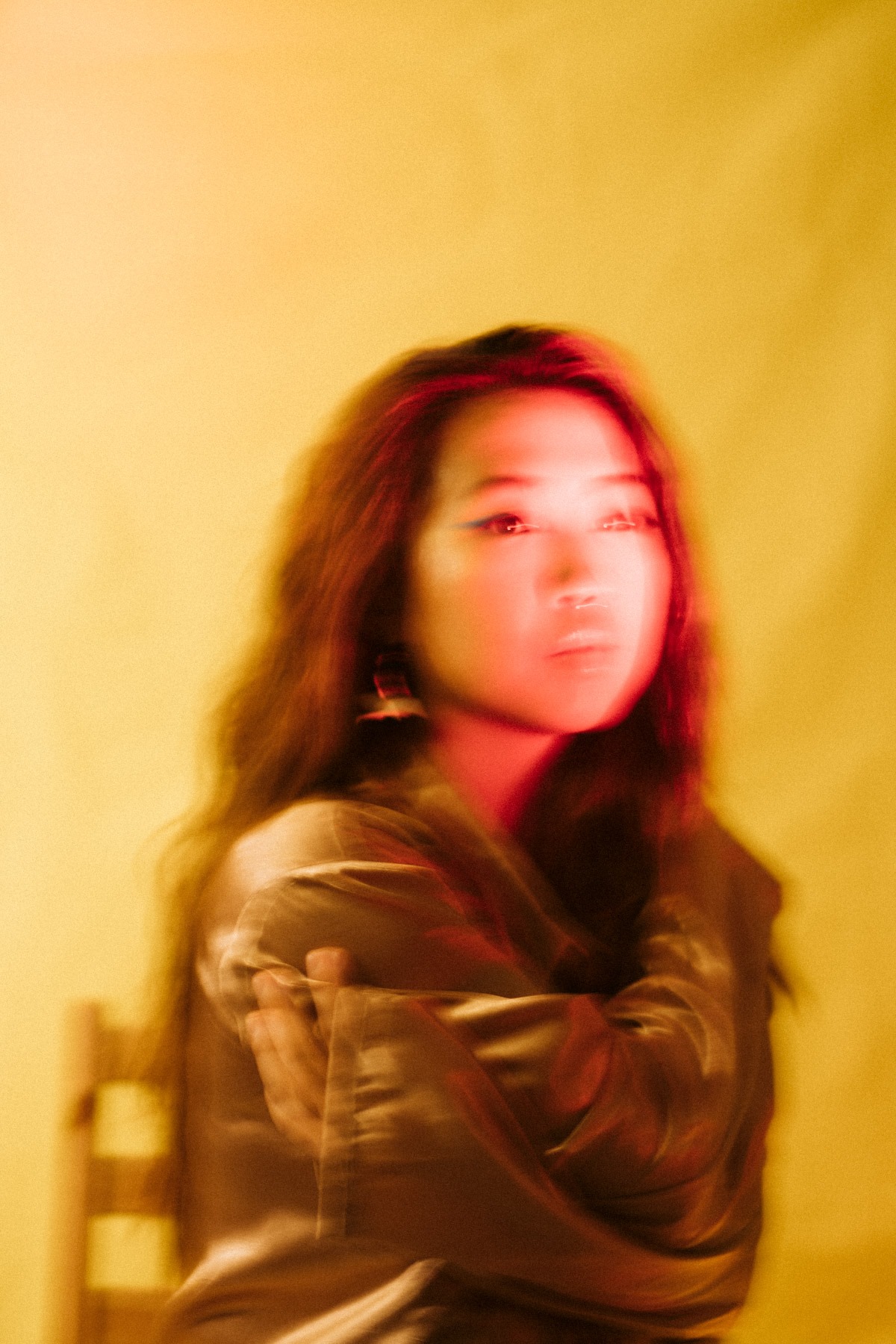
You mentioned in your interview with Vogue UK, that the process of loving your Korean identity and finding yourself beautiful took time. Where are you on this journey right now?
Hunjiya: Now, I’m at a point where I’ve come to terms with the fact that I will never be one-sided and that’s totally okay. I’m currently furthering my studies in learning Korean and watching/listening to more Korean TV shows and music which has helped me bond with my parents and understand the culture even more. I moved back home with my parents after COVID hit, and it’s allowed me to spend more time with them and learn even more about my family’s roots.
Asians who live in the west and are part of the Asian diaspora are in a unique position in that they are bombarded by western standards of beauty which focus primarily on whiteness as the standard, and yet within Asian countries themselves, even though their beauty standards are compounded by colonisation, the what is deemed beautiful can be quite different. Do you think this makes self acceptance an even more complicated process for Asians primarily raised in the west?
Hunjiya: Of course. I think every Asian person/minority group deals with this at least one point in their life. Personally, I naturally tan and growing up, I had white people tell me they wanted to have my complexion. Then I’d go to Korea, and my relatives would say I was too dark. As a kid, I’ve gotten made fun of for my eyes and I would literally spend all night taping my eyelids to see if they would form double eyelids.
Now, the “fox-eye” trend (which is racist) is in. There will always be unrealistic, one-sided standards and westernised definitions of what is deemed “beautiful” no matter where you go – especially for women because big companies profit off of telling young girls to buy products that’ll make them more “attractive.” It’s BS.
I’m just thankful that now in 2020, there are more people with larger platforms speaking out and making a change concerning what is considered “standard”. I think and hope the main solution is having more genuine representation within the entertainment we consume and badgering large companies to stop promoting unrealistic beauty standards.

While on the mainstream circuit, Asian Americans are still grossly underrepresented in the music and entertainment industry, there seems to be space in the more underground circuits with artists like Japanese Breakfast’s Michelle Zauner, Mitski, and Yaeji garnering lots of positive attention. Why do you think mainstream music representation for Asian-Americans (and other Asians who are part of the Asian diaspora) is lagging so far behind?
Hunjiya: I think the mainstream market is usually run by bigger labels with billions of dollars who are run by old white men who might not want to necessarily take the risk of investing in something they haven’t done before (aka simply adding diversity).
However, I actually think the increasing representation and opportunities for Asian folx is happening because the artists are taking the initiative into their own hands. I’m seeing artists from 88rising hailing to the top of the charts. Jay Park is fusing the Korean hip hop scene with the American scene, Rina Sawayama is now signed with Dirty Hit, and many more Asian artists are gaining attention.
Will you continue to produce under Hunjiya as well?
Hunjiya: I’m always producing and creating, so yes!
What other big projects are coming up for you this year?
Hunjiya: You’ll just have to wait and find out!
_
Images provided by Hunjiya. Follow Hunjiya on Instagram here. To keep up with Hunjiya on Bandcamp, click here. For more art and culture, click here.



